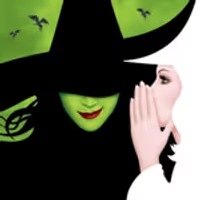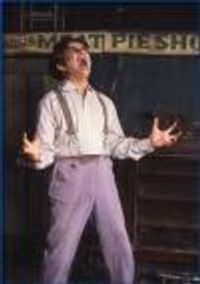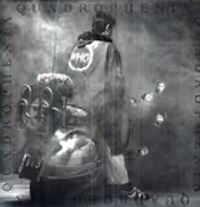How do actors keep from getting bored doing the same show over and over again?
#25re: How do actors keep from getting bored doing the same show over and over
Posted: 11/28/08 at 3:58pmNo more boring than other jobs - A receptionist sits at a desk all day every day, a waiter serves all day every day. Just the way of the job.
#26re: How do actors keep from getting bored doing the same show over and over
Posted: 11/28/08 at 5:44pmWhen Chris Fitzgerald was in Young Frankenstein, he changed up some of his scenes every night. I really don't know how he comes up with some of that stuff. It's hilarious!
beacon1
Broadway Legend Joined: 1/31/04
#27re: How do actors keep from getting bored doing the same show over and over
Posted: 11/28/08 at 7:47pm
It seems like they enjoy the work of winning over the audience each night--like a salesman lives to close a deal.
As for the crew/creative team...I can see how you could go nuts. I did the makeup last year for Joseph ATATDC and still can not listen to the score. My boss was whistling a section of it on Wednesday and I had to shut the door to my office. It put my teach on edge--and it's not a song a dislike. I just can't handle it right now. And, the same goes for "My Fair Lady" when I was Prop Mistress. Don't even start with "All I want is a room somewhere..." because I'll need to leave the room.
Hopefully...in time... :o)
Patrick Wilson Fans --New "UnOfficial Fan Site". Come check us out!
#28re: How do actors keep from getting bored doing the same show over and over
Posted: 11/28/08 at 8:56pmAlcohol and drugs.
#29re: How do actors keep from getting bored doing the same show over and over
Posted: 11/28/08 at 10:42pm
"It takes a very special kind of person to be a true theatre professional, and being able to perform at the same level over weeks and months is just one of those things that comes with the territory."
Amen to that.
I'm not a true theatre professional, so what keeps me from being bored is... being bored. You get bored, you lose concentration, you make a mistake because of it, you feel embarrassed, you concentrate *much* better during the next performance, and that improved concentration makes you see the show in a new way.
touchmeinthemorning
Broadway Legend Joined: 9/3/04
#30re: How do actors keep from getting bored doing the same show over and over
Posted: 11/29/08 at 11:50amThere is a major difference between being a professional and being an artist. A professional will be content to hit their marks and collect a check. An artist will never stop learning things about themself, the character, the process, and the show.
Psychopathic Sanity
Swing Joined: 11/29/08
#31re: How do actors keep from getting bored doing the same show over and over
Posted: 11/29/08 at 6:01pmlol, well, you have to remember, nothing ever goes perfectly in a show. usually, something minor goes wrong and the performer has to improv or change something slightly to get through it. that's what keeps it alive, and you always have to be on your toes in case something like that happens.
#32re: How do actors keep from getting bored doing the same show over and over
Posted: 11/29/08 at 6:38pmThe plate throwing in Gypsy certainly keeps Patti, Laura Benanti, and Boyd Gaines on their toes.
#33re: How do actors keep from getting bored doing the same show over and over
Posted: 11/29/08 at 9:49pmFor me, I did the Last 5 Years for an eleven week run. After a while I had to start trying new things. As an actor I found that songs that meant one thing to me one night the next night was completely different. A lot of times my objectives as an actor changed. Some nights the whole song was about getting the girl playing Catherine to break into a huge smile. You find different lyrics mean completely different things to you especially from night one to night 72. Also who was in the audience. We would be backstage and usually there was someone in the audience we knew. So we would dedicate the performance mentally to that person. There are a lot of different ways. I think the hardest is as a chorus member because you don't have a lot that you can change. Especially if you are mainly a dancer in a show. I remember when I was doing Miss Saigon (as a chorus member) being so bored every night. The show was so tight and there was literally nothing you could change without the stage manager or director yelling at you. It was the most unimaginative performance but I found it almost more challenging to stay motivated because I couldn't change anything. Its different for every person. Some people like the security of doing the same role because they know it so well.
#34re: How do actors keep from getting bored doing the same show over and over
Posted: 11/30/08 at 1:00am
Uta Hagen was known for keeping a desk calendar in her dressing room and a packet of gold stars. She would put a gold star in the calendar after a performance that she felt was perfect. Reportedly, there would only be three or four gold stars in the calendar after the end of a two month regional run. It's about striving for perfection and always knowing you can be better.
Russian theatre companies can rehearse a play for up to a year before they bring in an audience. A 3 week rehearsal period and three week preview before opening seems almost insufficient in comparison to truly plumb the depths of a character unless you are only playing the role on a surface level.
If you have stopped striving and learning, it's time to move on to a different role or career path.
#35re: How do actors keep from getting bored doing the same show over and over
Posted: 11/30/08 at 2:09pmIn the case of the current Chicago revival, the ensemble comes up with interesting points to talk about onstage.
#36re: How do actors keep from getting bored doing the same show over and over
Posted: 11/30/08 at 3:07pm
I agree, Bobby. I've never done more than a six-week regional run, but what kept it exciting for me during those times was the goal of trying to perfect my performance. Granted, no performance should ever be exactly the same, but to continually explore and strive to be as good as humanly possible--that's a treat for me.
It really helps if the show is good though, and if you sincerely enjoy doing it. I did a summer stock run of "The Full Monty" for twelve performances or something and I gladly would have done it for a full year. But I recently played Reverend Moore in a summer stock "Footloose" and after a few performances I was like, "OK, I'm done with this show," LOL. I did my best to continue to be working at 110% and firing at all cylinders for the rest of the run, but when you really hate the show or your role it can be really difficult. If I had to do a year of "Footloose" I would shoot myself. But there are many other shows I've been in that I would have gladly done for more than a year.
#37re: How do actors keep from getting bored doing the same show over and over
Posted: 11/30/08 at 5:06pm
Oddly enough, it's easier for me to keep it fresh when it's a more difficult character. Not necessarily more complex, but...a character that doesn't come naturally to me. I just finished a run of You Can't Take It With You as Penny, and she was the antithesis of the kinds of parts I usually play. It was a great thrill and a great challenge, but I found that, come performance time, because I knew that this was real work, it was a lot easier to keep myself from getting lazy. I'd go out with a conscious decision to give 110%. It also helped that the other cast members would really recognize that I was stepping it up.
Another good point: you can always find new things to react with. Nobody's performance is exactly the same, which means that your castmates are giving you something new each night to discover and react to. It's all about the details.
Videos










